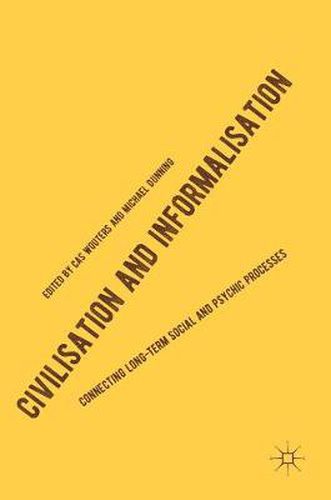Readings Newsletter
Become a Readings Member to make your shopping experience even easier.
Sign in or sign up for free!
You’re not far away from qualifying for FREE standard shipping within Australia
You’ve qualified for FREE standard shipping within Australia
The cart is loading…






This title is printed to order. This book may have been self-published. If so, we cannot guarantee the quality of the content. In the main most books will have gone through the editing process however some may not. We therefore suggest that you be aware of this before ordering this book. If in doubt check either the author or publisher’s details as we are unable to accept any returns unless they are faulty. Please contact us if you have any questions.
Over the last century and a half, manners and formalities in the West have become less status-ridden, stiff and rigid. Debates around Norbert Elias’ theory of civilising processes gave rise to questions of a change in direction of these patterns. The concept of informalisation, which describes these transformations, was first used to analyse the tumultuous changes of the 1960s and 1970s. This increasing informality, leniency and flexibility, comes hand-in-hand with a growing demand on individuals to self-regulate their emotions.
This book will stimulate debate around the changes in the standards of manners and emotion regulation, and will generate new avenues of enquiry that focus on issues involving informalisation. The chapters shed light on a variety of such moral and political issues over the last 150 years, offering a new and broader scope on the present social condition of humanity. Civilisation and Informalisation will be an important addition for students and scholars of figurational process sociology, and of broader interest to academics across sociology, social psychology and social history.
$9.00 standard shipping within Australia
FREE standard shipping within Australia for orders over $100.00
Express & International shipping calculated at checkout
This title is printed to order. This book may have been self-published. If so, we cannot guarantee the quality of the content. In the main most books will have gone through the editing process however some may not. We therefore suggest that you be aware of this before ordering this book. If in doubt check either the author or publisher’s details as we are unable to accept any returns unless they are faulty. Please contact us if you have any questions.
Over the last century and a half, manners and formalities in the West have become less status-ridden, stiff and rigid. Debates around Norbert Elias’ theory of civilising processes gave rise to questions of a change in direction of these patterns. The concept of informalisation, which describes these transformations, was first used to analyse the tumultuous changes of the 1960s and 1970s. This increasing informality, leniency and flexibility, comes hand-in-hand with a growing demand on individuals to self-regulate their emotions.
This book will stimulate debate around the changes in the standards of manners and emotion regulation, and will generate new avenues of enquiry that focus on issues involving informalisation. The chapters shed light on a variety of such moral and political issues over the last 150 years, offering a new and broader scope on the present social condition of humanity. Civilisation and Informalisation will be an important addition for students and scholars of figurational process sociology, and of broader interest to academics across sociology, social psychology and social history.